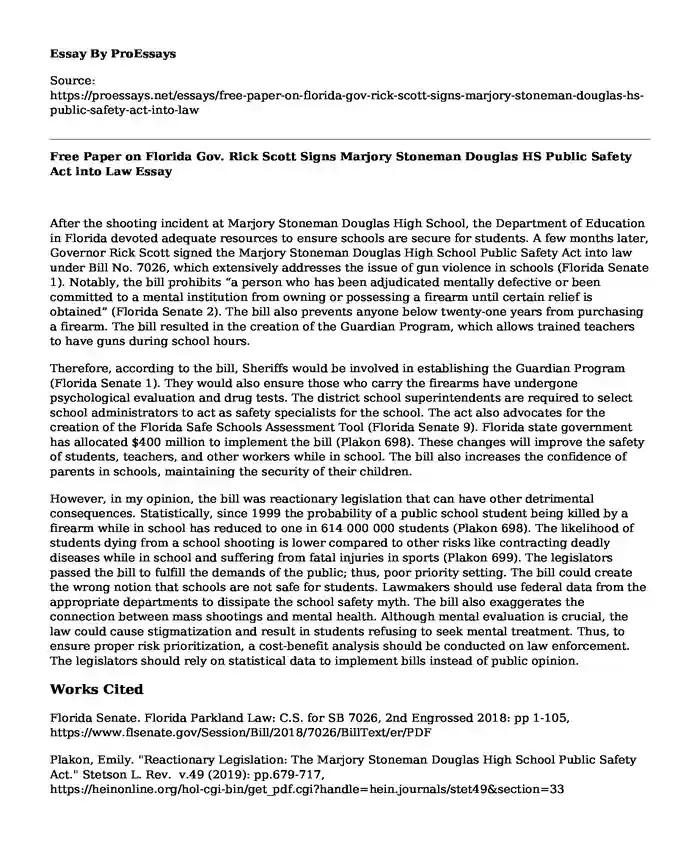After the shooting incident at Marjory Stoneman Douglas High School, the Department of Education in Florida devoted adequate resources to ensure schools are secure for students. A few months later, Governor Rick Scott signed the Marjory Stoneman Douglas High School Public Safety Act into law under Bill No. 7026, which extensively addresses the issue of gun violence in schools (Florida Senate 1). Notably, the bill prohibits “a person who has been adjudicated mentally defective or been committed to a mental institution from owning or possessing a firearm until certain relief is obtained” (Florida Senate 2). The bill also prevents anyone below twenty-one years from purchasing a firearm. The bill resulted in the creation of the Guardian Program, which allows trained teachers to have guns during school hours.
Therefore, according to the bill, Sheriffs would be involved in establishing the Guardian Program (Florida Senate 1). They would also ensure those who carry the firearms have undergone psychological evaluation and drug tests. The district school superintendents are required to select school administrators to act as safety specialists for the school. The act also advocates for the creation of the Florida Safe Schools Assessment Tool (Florida Senate 9). Florida state government has allocated $400 million to implement the bill (Plakon 698). These changes will improve the safety of students, teachers, and other workers while in school. The bill also increases the confidence of parents in schools, maintaining the security of their children.
However, in my opinion, the bill was reactionary legislation that can have other detrimental consequences. Statistically, since 1999 the probability of a public school student being killed by a firearm while in school has reduced to one in 614 000 000 students (Plakon 698). The likelihood of students dying from a school shooting is lower compared to other risks like contracting deadly diseases while in school and suffering from fatal injuries in sports (Plakon 699). The legislators passed the bill to fulfill the demands of the public; thus, poor priority setting. The bill could create the wrong notion that schools are not safe for students. Lawmakers should use federal data from the appropriate departments to dissipate the school safety myth. The bill also exaggerates the connection between mass shootings and mental health. Although mental evaluation is crucial, the law could cause stigmatization and result in students refusing to seek mental treatment. Thus, to ensure proper risk prioritization, a cost-benefit analysis should be conducted on law enforcement. The legislators should rely on statistical data to implement bills instead of public opinion.
Works Cited
Florida Senate. Florida Parkland Law: C.S. for SB 7026, 2nd Engrossed 2018: pp 1-105, https://www.flsenate.gov/Session/Bill/2018/7026/BillText/er/PDF
Plakon, Emily. "Reactionary Legislation: The Marjory Stoneman Douglas High School Public Safety Act." Stetson L. Rev. v.49 (2019): pp.679-717, https://heinonline.org/hol-cgi-bin/get_pdf.cgi?handle=hein.journals/stet49§ion=33
Cite this page
Free Paper on Florida Gov. Rick Scott Signs Marjory Stoneman Douglas HS Public Safety Act into Law. (2023, Nov 19). Retrieved from https://proessays.net/essays/free-paper-on-florida-gov-rick-scott-signs-marjory-stoneman-douglas-hs-public-safety-act-into-law
If you are the original author of this essay and no longer wish to have it published on the ProEssays website, please click below to request its removal:
- Justice in Disguise in Middle Passage by Hayden Essay
- Drug Courts Essay Example
- Essay Sample on Never Again: Ms. Gonzalez's Dramatic Speech After School Shooting
- Essay Sample on A Girl's Journey: Growing Up in a Challenging World
- Paper Example on Social Structure Perspective: Exploring the Impact on Behaviour
- Research Paper on Gender Equality in Education: A Global Overview Since 1995
- Ex-Convicts Reentering Society: Challenges & Solutions - Essay Sample







